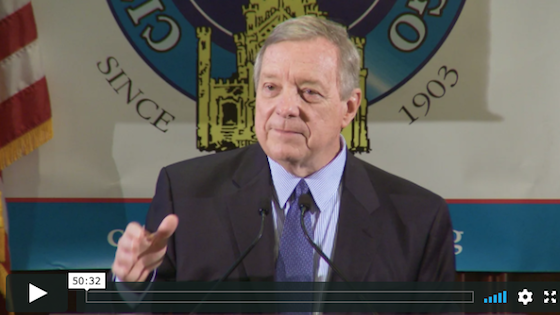The Chicago HEAL Initiative
Gun violence is currently the leading cause of death for children and teens across America. Addressing Chicago’s gun violence epidemic requires a focus not just on sensible gun safety reforms, but also the underlying factors that contribute to gun violence, including health challenges, inequality, and poverty. That’s why I’ve joined forces with major Chicago hospitals on a groundbreaking community initiative to reduce violence and improve health. It’s called the Chicago HEAL Initiative (Hospital Engagement, Action, and Leadership), and it’s a collaboration between major Chicago hospitals, that I’ve convened and supported, to make tangible commitments to reduce gun violence, heal the physical and mental trauma that violence inflicts on victims, increase well-paying jobs, and create new economic opportunities in the neighborhoods these hospitals serve.
Not only do Chicago’s world class hospitals care for physical wounds and mental health challenges inflicted by violence, they are very often the largest employers and drivers of economic opportunity in their neighborhoods. The Chicago HEAL Initiative is a unique collaboration—among hospitals who traditionally compete with one another—and my role is not just to be a supportive partner, convener, and advocate, but also to assist these hospitals and our communities by fighting for access to health care and increasing federal resources for Chicago.
As an initial step in this multi-year effort, read the public action plan and commitments from HEAL Initiative hospitals here:
I recently released a five-year report of the Chicago HEAL Initiative, which highlights significant progress made by the hospitals in local hiring, job training and mentorship, and trauma-informed care and youth mental health activities.
The HEAL hospitals have sustained impressive efforts to collaborate around four main topics: local hiring; school/community programs; trauma/violence recovery programs; and data sharing. Among other highlights, in calendar year 2023, the hospitals:
- Hired 4,402 new employees from the 18 focus neighborhoods (a 50 percent increase compared to the launch of HEAL in 2018).
- Provided 4,403 local students with summer employment, pipeline, or apprenticeship programs (a 31 percent increase from last year).
- Partnered with 253 Chicago Public Schools (a 20 percent increase from last year), including operating 16 school-based health clinics/mobile health units that served 7,599 students.
- Provided 2,614 victims of violence with ongoing trauma-informed case management and recovery programs (a 43 percent increase since 2018).
Watch my full speech announcing Chicago HEAL at the City Club of Chicago:
- Advocate Christ Medical Center
- AMITA Health’s Saints Mary and Elizabeth Medical Center
- Ann and Robert H. Lurie Children’s Hospital of Chicago
- Cook County Health and Hospital System
- Loyola University Medical Center
- Northwestern Memorial Hospital
- Rush University Medical Center
- Sinai Health System
- University of Chicago Medical Center
- University of Illinois Hospital and Health Sciences Systems
Latest
-
07.03.24
Durbin, Duckworth Applaud Federal Approval Of Illinois Application For Medicaid 1115 Waiver
-
06.25.24
Durbin Statement On Surgeon General Advisory Highlighting Firearm Violence As Urgent Public Health Issue
-
05.06.24
Durbin, Hospital Leaders Release Year 5 Report On Chicago Heal Initiative To Address Gun Violence
-
06.05.23
Durbin, Hospital Leaders Release Year 4 Report on Chicago HEAL Initiative to Address Gun Violence
-
12.22.22
Durbin Secures $6.25 Million In Funding For Chicago HEAL Initiative In Fy23 Omnibus Appropriations Bill
-
04.21.22
Durbin, Hospital Leaders Release Year 3 Report On Chicago HEAL Initiative To Address Gun Violence
-
05.04.21
Durbin, Hospital Leaders Release Chicago HEAL Initiative Two-Year Progress Report
-
04.19.21
Durbin Urges Biden To Look At Chicago HEAL Initiative As Model For Community Violence Intervention Programs
-
05.28.20
Durbin Releases Chicago HEAL Initiative 2020 Report

